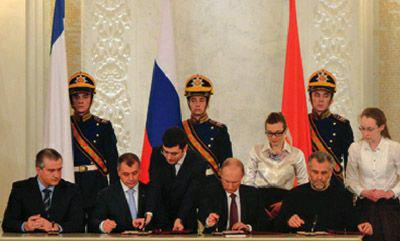Compromising Over Crimea
2014-04-11Bydingying
By+ding+ying

After Crimea passed—with an overwhelming majority of votes—a decision to join Russia in a referendum held on March 16, Russian President vladimir Putin won a victory that subsequently enraged the West enough to declare economic sanctions, but not enough to risk military conflicts with Russia.
It now appears that there is no immediate danger of war, and Chinese analysts have claimed the situation is still on the track of political settlement.
putins decision
Russia moved swiftly to absorb Crimea after it declared independence from Ukraine. Putin asked the parliament on March 18 to ratify a treaty adopting two new regions, the Republic of Crimea and the city of Sevastopol, into its territory. Two days earlier, a referendum was held in Crimea, in which 96.77 percent of Crimean voters supported joining Russia.
“Russia bet that the West would not have a strong reaction. For now, everything has gone as Russia expected,” said Li Zhiguo, a researcher on Russian studies with the China Institute of International Studies (CIIS) to Beijing Review.
The Wests interests in Ukraine are simply not serious enough to start a war. But to Russia, Crimea is important enough to warrant risking the costs of war to get it. Li explained that European countries, which depend on natural gas from Russia, will not undertake extreme efforts to contest the recent developments. The majority of residents in Crimea are ethnic Russians. Moreover, Russias Black Sea Fleet is stationed in Sevastopol on the Crimean Peninsula, added Li, making the peninsula an area of geo-strategic significance for Russia. The researcher noted that from 1941 to 1942, the Soviet Union and Nazi Germany fought over Crimea for a full year.
In a speech on March 19, Putin said he will respect the Crimean peoples wishes, stressing Crimeas decision was fully in accordance with international law—in particular with Article 1 of the UN Charter that stipulates the principle of equality and selfdetermination of peoples. “Crimea is part of our common heritage and a key factor of stability in the region. This strategic territory should be under strong, stable sovereignty,which in effect can only be Russian,” he said.
Li said the situation would be different if the West had stopped pressuring Russia after Ukrainian President viktor yanukovych, who is pro-Russia, announced an early presidential election as one of the measures aimed at ending the countrys political crisis on February 21.endprint
“Ukraines political power in the countrys western areas intended to clear away pro-Russia forces in the eastern regions, and upgraded the political crisis in Kiev, which enraged Russia,” Li added. Russia maintained a rather moderate policy toward Ukraine after the West-backed “Orange Revolution” in Ukraine in 2004. “Now Putin is determined to land a blow that can make the West feel the pain,” said the researcher.
During his speech, Putin repeatedly slammed the West as a whole—and the United States in particular—for hypocrisy and the use of double standards. The situation in Ukraine mirrored what had been happening in the world after the collapse of the bi-polar system, because the United States started to believe in its exceptional right to pursue its interests by force, he said. Still, Putin said, Moscow did not seek confrontation with its partners in the East and the West.
Former Chinese Ambassador to Russia Gao yusheng pointed out that the reason why Putin moved to adopt Crimea is that the Russian president believed retreating was not an option. Even if Russia agreed to let Crimea be an independent state, the West still would launch sanctions on Russia, said Gao.
As Russia regains its lost territory, Putins personal reputation as a tough and powerful leader has reached a new high. Crimea, historically part of Russia, was transferred to Ukraine in 1954, then a republic of the Soviet Union.
According to latest polls in Russia, Putins favorable rating among Russian people reached over 70 percent. Russias parliamentary election will be held in September, and the overwhelming patriotism will surely help the ruling party to win.
Future ‘cool war
Whats done is done. Neither Ukraine, nor the West, can change Crimeas determination to join Russia. Observers predicted the relationship between the West and Russia will enter a“cool war” stage, which will be much weaker than the previous Cold War. If all related parties remain committed to finding a political solution, regional stability is still promising.
The international community is worried that the referendum on the Crimean Peninsula will trigger a domino effect in east Ukraine, as many pro-Russia cities may choose to follow Crimeas suit and apply to join Russia. In his speech on March 19, Putin said that Moscow did not seek and did not need to split Ukraine. “On the contrary, we will do everything to build civilized good-neighborly relations, as is accepted in the modern world,” Putin promised.endprint
“There are still possibilities that such a domino effect might occur,” Li said. According to Li, the result of the upcoming Ukrainian presidential and parliamentary elections will decide whether or not such a situation will happen.
Li stressed that if eastern Ukrainian regions can share in the political process of Ukraine after the elections, wherein Russia still can have a say in the countrys events like the West, Russia will not further intervene in Ukraines domestic political affairs. However, if pro-Russia forces are excluded after the elections, Moscow might continue to push forward east Ukraines intention of joining Russia, Li added.
There will be very little danger of military conflicts in Ukraine over Crimea, Li said. “First of all, the West doesnt have so many interests there. Without assistance from the West, Ukraine doesnt have the ability to confront a strong power like Russia,” Li claimed.
U.S. President Barack Obama said on March 19 that the United States would not take military action in Ukraine against Russia. “We are not going to be getting into a military excursion in Ukraine,” Obama said in an interview with KNSD, a California-based broadcaster.
“I think even the Ukrainians would acknowledge, for us to engage Russia militarily would not be appropriate and would not be good for Ukraine, either,” Obama said. “What we are going to do is mobilize all of our diplomatic resources to make sure that weve got a strong international coalition that sends a clear message.”
In response to the Ukrainian crisis, the Obama administration has focused on providing economic aid to Ukraine and imposing sanctions against Russia. Obama announced sanctions against 11 Russian and Ukrainian officials who the United States said are responsible for threatening Ukraines sovereignty and ter- ritorial integrity on March 17. He indicated that further sanctions could be on the way.
Unlike the Cold War, which featured a complete confrontation in political, economic and military aspects, the scope of the “cool war”is limited, said Li. “Against the background of globalization, it is impossible for Russia and the West to cut all connections between them,” he said, adding that the two sides will remain alert to each other in the foreseeable future.
Li also noted that current economic sanctions against Russia will not be as effective as the West expected. “Europe is still in demand of Russias natural gas, and the trade volume between Russia and the United States is not big enough to validate the sanctions,” Li explained.endprint
Gao predicted that there is still a possibility that the West and Russia could reach a shortterm compromise—for example, supporting Ukraine establishing an administration that both of them can accept. However, Gao said, the Crimean crisis will greatly influence relations between the West and Russia, while their game over Ukraine will continue. He suggested that Ukraine should maintain a balance between Moscow and the West, which he said will be a rational and practical choice.
The international community should make constructive efforts to defuse the tension, spokesman of the Chinese Ministry of Foreign Affairs Hong Lei said on March 19. “We believe that this issue should be resolved politically under a framework of law and order. All parties should exercise restraint and avoid taking actions that may sharpen the dispute,” said Hong. Under the current circumstances, a political settlement should be sought on the basis of respecting all parties reasonable concerns and legitimate rights and interests, he added.
yang Chengxu, a senior research fellow with the CIIS, said that Ukrainian people shouldnt be forced to choose a side between the West and Russia. Beijing is willing to offer its suggestions to help Ukrainian people get out of economic recession and political instability, he said. China, which has contracts with Ukraine totaling over$10 billion, surely hopes Ukraine will remain stable, he added. “China takes a fair and just attitude in the Crimean crisis, which is in favor of Ukrainian peoples long-term interests,” yang stressed.endprint
